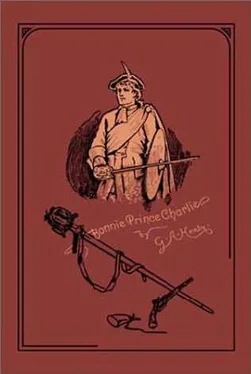Bonnie Prince Charlie
A Tale of Fontenoy and Culloden
by G. A. Henty
CHAPTER I: The Return of a Prodigal.
It was a dull evening in the month of September, 1728. The apprentices had closed and barred the shutters and the day's work was over. Supper was laid in the long room over the shop, the viands were on the table, and round it were standing Bailie Anderson and his wife, his foreman John Gillespie, and his two apprentices. The latter were furtively eying the eatables, and wondering how much longer the grace which their master was delivering would be. Suddenly there was a knock at the door below. No one stirred until the bailie had finished his grace, before which time the knock had been twice repeated.
“Elspeth, woman,” the bailie said when he had brought the grace to an end, “go down below and see who knocks so impatiently; look through the grille before you open the door; these are nor times when one opens to the first stranger who knocks.”
The old servant, who had been standing behind her mistress, went downstairs. The door was opened, and they heard an exclamation of surprise at the answer to her question, “Who is it that's knocking as if the house belonged to him?”
Those gathered up stairs heard the bolts withdrawn. There was a confused sound of talking and then a heavy step was heard ascending the stairs, and without introduction a tall man, wrapped in a cloak and carrying a child of some two years old, strode into the room. He threw his hat on to a settle and advanced straight towards the bailie, who looked in surprise at this unceremonious entry.
“Don't you know me, Andrew?”
“Heaven preserve us,” the bailie exclaimed, “why it's Malcolm!”
“Malcolm himself,” the visitor repeated, “sound in wind and limb.”
“The Lord be praised!” the bailie exclaimed as he grasped the other's hand and wrung it warmly. “I had thought you dead years and years ago. Janet, this is my brother Malcolm of whom you have often heard me speak.”
“And of whom you can have heard little good, mistress, if my brother has spoken the truth concerning me. I was ever a ne'er do well, while Andrew struck hard and fast to our father's trade.”
“My husband has ever spoken with affection of you,” Janet Anderson said. “The bailie is not given to speak ill of any, much less of his own flesh and blood.”
“And now sit down, Malcolm. Supper is waiting, and you are, I doubt not, ready for it. It is ill talking to a fasting man. When you have done you shall tell me what you have been doing for the last fifteen years, and how it comes that you thus suddenly come back among us with your boy.”
“He is no boy of mine,” Malcolm said; “but I will tell you all about it presently. First let me lay him down on that settle, for the poor little chap is fast asleep and dead tired out. Elspeth, roll up my cloak and make a pillow for him. That's right, he will do nicely now. You are changed less than any of us, Elspeth. Just as hard to look at, and, I doubt not, just as soft at heart as you used to be when you tried to shield me when I got into scrapes. And now to supper.”
Little was said during the meal; fortunately the table was bounteously spread, for the newcomer's appetite was prodigious; but at last he was satisfied, and after a long drink at the horn beside him, which Elspeth had kept filled with ale, he said:
“There's nothing like a Scottish meal after all, Andrew. French living is well enough for a time, but one tires of it; and many a time when I have been lying down supperless on the sod, after marching and fighting the whole day, I have longed for a bowl of porridge and a platter well filled with oatmeal cakes.”
Supper over, John and the apprentices retired. Elspeth went off to prepare the guest's chamber and to make up a little bed for the child.
“Now, brother, let us hear your story; but, first of all, perhaps you want to light your pipe?”
“That do I,” Malcolm replied, “if Mistress Janet has no objection thereto.”
“She is accustomed to it,” the bailie said, answering for her. “I smoke myself; I deem that tobacco, like other things, was given for our use, and methinks that with a pipe between the lips men's brains work more easily and that it leadeth to pleasant converse.”
Janet went to a cupboard, brought out two long pipes and a jar of tobacco, placed two tumblers, a flat bottle, and a jug of water on the table.
“That is right,” the bailie said. “I do not often touch strong waters. The habit, as I see too plainly, is a harmful one, and in this good city of Glasgow there are many, even of those so placed that they should be an example to their fellows, who are given nightly to drink more than is good for them; but on an occasion like the present I deem it no harm to take a glass.”
“I should think not,” Malcolm said heartily; “it is long since I tasted a glass of real Scotch spirit, and I never need an excuse for taking a glass of whatever it be that comes in my way. Not, Mistress Janet, that I am a toper. I don't say that at the sack of a town, or at times when liquor is running, so to speak, to waste, I am more backward than the rest; but my hand wouldn't be as steady as it is if I had been one of those who are never so happy as when they are filling themselves with liquor. And now, Andrew, to my story. You know that when I saw you last —just when the troubles in `15 began —in spite of all your warnings to the contrary, I must needs throw myself into the thick of them. You, like a wise man, stuck to your shop, and here you are now a bailie of Glasgow; while I, who have been wandering over the face of the earth fighting for the cause of France and risking my life a thousand times in a matter which concerned me in no way, have returned just as penniless as I set out.”
“It is said, brother Malcolm,” Janet said mildly, “that a rolling stone gathers no moss.”
“That is true enough,” Malcolm assented; “and yet do you know there are few rolling stones who, if their time were to come over again, would remain fixed in their bed. Of course we have not the pleasures of home, of wives and children; but the life of adventure has its own joys, which I, for one, would not change for the others. However, brother, as you know, I threw myself heart and soul into that business.
“The last time I saw you was just as I was starting with a score of others to make our way to join the Earl of Mar's army at Perth. I have seen many an army since, but never did I see sixteen thousand finer fighting men than were there assembled. The Laird of Mackintosh brought five hundred clansmen from Inverness shire, the Marquis of Huntly had five hundred horse and two thousand foot, and the Earl Marischal had a thousand men. The Laird of Glenlyon brought five hundred Campbells, and the Marquis of Tullibardine fourteen hundred, and a score of other chiefs of less power were there with their clansmen. There were enough men there to have done anything had they been properly armed and led; but though arms and ammunition had been promised from France, none came, and the Earl of Mar had so little decision that he would have wrecked the finest army that ever marched.
“The army lay doing nothing for weeks, and just before we were expecting a movement, the company I belonged to was sent with a force of Highlanders under Mackintosh to join the army under the Lords Derwentwater, Kenmure, and Nithsdale. Lord Derwentwater had risen with a number of other gentlemen, and with their attendants and friends had marched against Newcastle. They had done nothing there but remained idle near Hexham till, joined by a force raised in the Lowlands of Scotland by the Earls of Nithsdale, Carnwath, and Wintoun, the united army marched north again to Kelso, where we joined them.
Читать дальше












